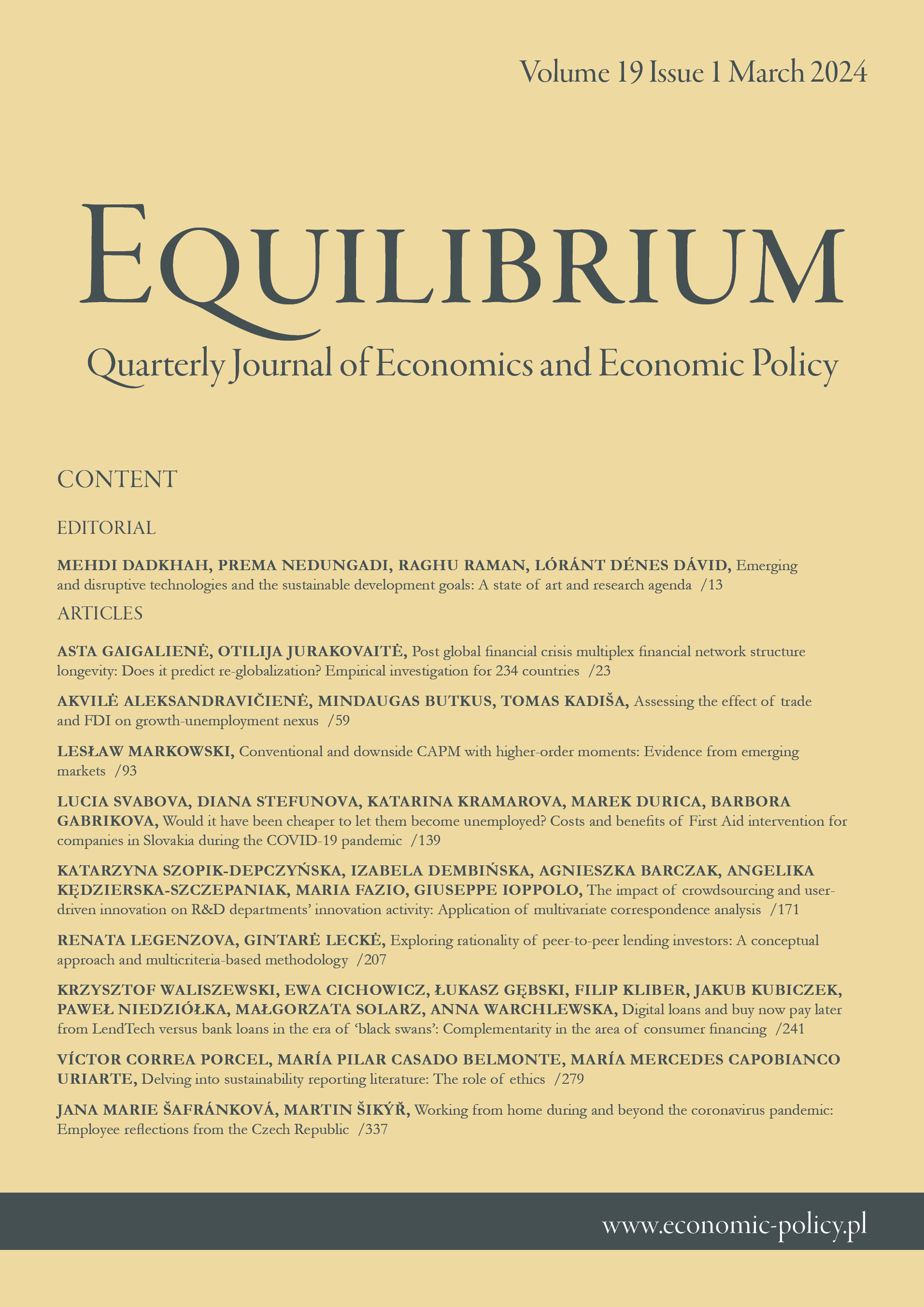企业声誉和社会媒体参与对中小企业可持续性的影响:高层管理者和所有者的看法
IF 6.2
Q1 ECONOMICS
Equilibrium-Quarterly Journal of Economics and Economic Policy
Pub Date : 2023-09-30
DOI:10.24136/eq.2023.025
引用次数: 1
摘要
研究背景:中小企业在各国经济中发挥着基础性作用。目前,企业家们不仅要应对不确定的商业环境,还要对企业的可持续经营抱有很高的期望。因此,企业声誉和社交媒体对可持续性的影响是企业家感兴趣的一个领域。在这方面,很少有人研究他们对这些问题之间的联系的看法。此外,中小企业的声誉和社交媒体的使用对其可持续发展的影响没有直接的解释,特别是在V4国家。本文目的:本文定义、量化并验证了V4国家中小企业所有者和高层管理人员所感知的企业声誉和社交媒体对可持续发展的影响。方法:采用计算机辅助网络访谈法(CAWI)于2022年12月和2023年1月收集资料。这项调查是在文献综述和专家意见的基础上设计的。受访者(中小企业的高层管理人员,n = 1090)被问及他们公司的特点,声誉,社交媒体的使用和可持续发展的问题。采用线性回归模型(LRM)对假设进行评估。的发现,附加值:研究显示,在中小企业中,所有者和高层管理人员对企业声誉和可持续发展的重要性的看法之间存在很强的关系。相信社交媒体支持公司绩效的增长与对可持续商业发展概念的理解有关。令人惊讶的是,对于V4国家的中小企业所有者和高层管理人员来说,使用社交媒体与客户和合作伙伴分享信息的意识与对可持续业务增长的理解之间没有关系。本文章由计算机程序翻译,如有差异,请以英文原文为准。
The impact of corporate reputation and social media engagement on the sustainability of SMEs: Perceptions of top managers and the owners
Research background: Small and medium-sized enterprises (SMEs) play a fundamental role in countries’ economies. Currently, entrepreneurs are struggling not only with the uncertainty of the business environment, but also with high expectations for businesses to be run in a sustainable way. Therefore, the impact of corporate reputation and social media on sustainability is an area of interest for entrepreneurs. In this context, little research has been conducted on their perception of the linkage between these issues. Furthermore, there has been no direct explanation of the effects of SMEs’ reputation and social media usage on their sustainable development, especially in the V4 countries. Purpose of the article: This article defines, quantifies, and verifies the effects of corporate reputation and social media on sustainable development as perceived by SMEs’ owners and top managers in the V4 countries. Methods: Data were gathered in December 2022 and January 2023 using the computer-assisted web interviewing (CAWI) method. The survey was designed based on a literature review and experts’ opinions. Respondents (top managers of SMEs, n = 1090) were asked questions on their firms’ characteristics, reputation, social media usage and sustainable development. The linear regression modelling (LRM) was utilised to evaluate the hypothesis. Findings & value added: The study revealed a strong relationship between owners’ and top managers’ perceptions of the importance of both corporate reputation and sustainable development in SMEs. The belief that social media supports the growth of companies’ performance is related to the understanding of the concept of sustainable business development. Surprisingly, for the owners and top managers of SMEs in V4 countries, there was no relationship between the awareness of social media usage to share information with customers and partners and the understanding of sustainable business growth.
求助全文
通过发布文献求助,成功后即可免费获取论文全文。
去求助
来源期刊
CiteScore
9.20
自引率
3.50%
发文量
28
审稿时长
36 weeks
期刊介绍:
Equilibrium. Quarterly Journal of Economics and Economic Policy is a scientific journal dedicated to economics, which is the result of close cooperation between the Instytut Badań Gospodarczych/Institute of Economic Research (Poland) and Polish Economic Society and leading European universities. The journal constitutes a platform for exchange of views of the scientific community, as well as reflects the current status and trends of world science and economy.
The journal especially welcome empirical articles making use of quantitative methods in: Macroeconomics and Monetary Economics, International Economics, Financial Economics and Banking, Public Economics, Business Economics, Labor and Demographic Economics, Economic Development, and Technological Change, and Growth.
Current most preferable topics and special issues:
The economics of artificial intelligence: business potentials and risks;
Digitalization and entrepreneurship in economics;
Sustainable socio-economic development, environmental and ecological economics;
Transition in the energy market (improving energy efficiency, alternative energy sources, renewable energy, energy security).

 求助内容:
求助内容: 应助结果提醒方式:
应助结果提醒方式:


